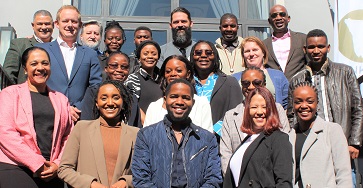
Engaged and committed workforce vital

Prisa committee members with Brian Anderson, who attended attended a Dale Carnegie Training Institute workshop hosted by Bright Communications, in connection with PRISA Namibia.
Up to thirty delegates from various Namibian businesses attended a Dale Carnegie Training Institute workshop hosted by Bright Communications, in connection with PRISA Namibia. At the workshop, according to the presenter Brian Anderson, the MD of Dale Carnegie, Johannesburg, companies need to focus on effective human relations, and leaders need to learn how to stop worrying and start living. In fact, the most successful organisations have engaged employees who feel a close attachment to the values, ethics and actions embodied by the organization. Said Anderson, “are your people-skills and relations authentic? Studies show that today’s millennials have between 500 – 5000 Facebook ‘friends’, but on average have only 1,5% real friends whom they engage with, talk with eye-to-eye, and have a real relationship with that is based on human-to-human interaction.” Added Anderson, people have become accustomed to ‘skipping dialogue’ forming a bigger ‘disconnect with people’. “Can you start a dialogue with a complete stranger?,” he proceeded. “The workshop delegates got an opportunity to learn just this skill, and the energy was fantastic”, noted Chairperson Maria Dax and her fellow committee members. It clearly is not all about presenting figures, solutions and art work – “but it is all about how you present those things, to whom you present them, and whether you engaged them to feel part of the process,” said Dax. On summarizing the workshop, Dax noted that it is apparent that “you need to have face-to-face conversations in order to create belief in senior leadership, to create satisfaction with supervisors or managers, and to create pride in an organisation.”













































